#CrippledAt17 #SingleWomanTravellingAlone #SisterKenny #RaisingBoys
My mum couldn’t jump puddles
I could not believe my eyes when my mother stood up and walked towards me. Mum had died years earlier. When she was alive, she was in a wheelchair and I never saw her walk. But this wasn't my mother. It was her sister Elsie, who I hadn’t seen for forty years. For a bewildering moment, though, I had thought it was mum. Auntie Elsie extended her hand and said, "Welcome to Africa."
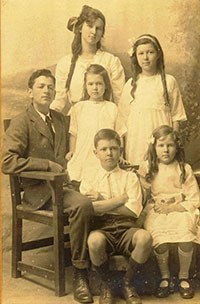 My mum Connie died in 1979. She was born in colonial Africa in 1916, the same year that the pride of Australian youth was slaughtered at the Somme. She was a gorgeous looking child, the youngest of six children. My mum had told me they were poor. When it rained, she said, the other white kids wore raincoats to school, but she had to wear a hessian bag.
My mum Connie died in 1979. She was born in colonial Africa in 1916, the same year that the pride of Australian youth was slaughtered at the Somme. She was a gorgeous looking child, the youngest of six children. My mum had told me they were poor. When it rained, she said, the other white kids wore raincoats to school, but she had to wear a hessian bag.
Mum’s father, Jesse Cuthbert, was a hard man. The Cuthbert line is strong, and my physical resemblance to him is frightening. He was born in Hackney Wick, London, in 1871, and migrated with his family to South Africa at the age of five. As a young man Jesse and a mate trekked from Jo’burg to Salisbury (the equivalent of walking from Melbourne to Goondiwindi). Jesse joined the Rhodesia Horse and suffered a serious hand wound during the brutal Matabele uprising. Discharged at his own request, he and the same mate paddled in a dugout canoe down the Pungwe River through wildest Africa to the Indian Ocean.
Jesse then boarded a freighter to Durban. On the beach there, he was shown a photograph of a 16-year-old English girl, Dora Sagar. “I am going to marry her,” he declared, and sailed to England where they courted and married. They honeymooned in Paris and lived with Dora’s parents, before travelling to Cape Town with the first two of their six kids. Their first home in Southern Rhodesia was a tin shed in a paddock, just a short stroll from central Salisbury.
Jesse built an elegant residence. He named it “Rainton House” after Dora’s village in Durham. All their married life, Jesse doted on Dora. He saved his meanness for the children and the servants. He would stand in front of his mulberry trees, pretending to count the fruit so no-one would help themselves. When he was out, the children were not allowed to leave the property. Woe betide children or servants if they were within kicking distance of him during one of his rages. He died from malaria at the age of 57. Mum was 11.
Mum thought of Dora as an angel. When Jesse was menacing the children, Dora would shield them with her body. She was as gentle as he was cruel. She died from blood loss after a hysterectomy at the age of 49, two weeks before mum’s fourteenth birthday. As the youngest, mum was placed in the collective care of her brothers and sisters. But by the time she was 17, she had contracted what was diagnosed as polio (from not washing her hands, she always told me).
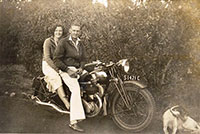 Rhodesian State Lottery paid mum’s way to Cape Town to be treated by specialists. The doctors put her legs in plaster casts for six months, possibly robbing her of any chance of walking again. When this treatment failed, all she could do was to return to Salisbury and make the best of things. I have many photographs of her from that brave time. She is straddling a motorbike, sitting on a picnic rug or propped up between two young men to make it look like she is standing on her own two feet.
Rhodesian State Lottery paid mum’s way to Cape Town to be treated by specialists. The doctors put her legs in plaster casts for six months, possibly robbing her of any chance of walking again. When this treatment failed, all she could do was to return to Salisbury and make the best of things. I have many photographs of her from that brave time. She is straddling a motorbike, sitting on a picnic rug or propped up between two young men to make it look like she is standing on her own two feet.
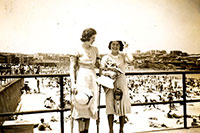 Before the war, Sister Kenny, an Australian bush nurse, discovered an effective way to treat polio. Despite her successes, however, she was scorned by our medical establishment and subjected to a Royal Commission. Nevertheless, her fame spread far and wide. In August 1939, on the eve of world war, mum’s brothers and sisters paid mum’s fare to cross the ocean alone so that she could be treated by this remarkable woman.
Before the war, Sister Kenny, an Australian bush nurse, discovered an effective way to treat polio. Despite her successes, however, she was scorned by our medical establishment and subjected to a Royal Commission. Nevertheless, her fame spread far and wide. In August 1939, on the eve of world war, mum’s brothers and sisters paid mum’s fare to cross the ocean alone so that she could be treated by this remarkable woman.
Mum arrived in Sydney after six weeks on the Dominion Monarch, expecting to be able to return home in a matter of months. She was shocked to see half naked white men swinging picks and pushing wheelbarrows on the streets and building sites of Sydney. In and out of hospital, she visited two uncles and their families in Gippsland. While she was there, according to Auntie Elsie, something terrible happened. Just what, Elsie didn’t know. Mum returned to Sydney and cut off from that branch of her family. She never mentioned them again.
In 1940 Sister Kenny was lured to the US. The Americans built her a modern hospital, and made a film about her. Mum’s treatment continued, but without real success. She rented squalid back rooms in inner Sydney and supported herself by working as a salesgirl in a department store. She desperately missed her family and friends, and as if things could not have got worse, she learned that her childhood sweetheart had been fatally shot down in the air war over Europe.
In hospital, mum had been befriended by another patient, Jim Maginnity, a farmer from Tooma on the Murray River. He invited her down for a holiday with his wife and kids. I remember her telling me she was standing, with the aid of calipers and crutches, on the platform at Sydney Central. Suddenly, she was literally swept off her feet. Three soldiers on leave had noticed her. They hoisted her and her luggage up into the carriage, plonked her down on to her seat and plied her with cigarettes and banter all the way to Albury. (She didn’t smoke.)
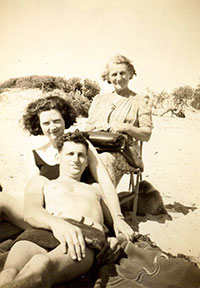 In 1943, mum moved to East Ivanhoe, in Melbourne. My father Neil lived next door with his mother. Before long, he was carrying mum … across the threshold of a tin shed in a paddock in Lower Plenty. In time, he built a fibro bungalow, and made her a wheelchair.
In 1943, mum moved to East Ivanhoe, in Melbourne. My father Neil lived next door with his mother. Before long, he was carrying mum … across the threshold of a tin shed in a paddock in Lower Plenty. In time, he built a fibro bungalow, and made her a wheelchair.
My older brother Chris and I were both born by caesarian section, since mum could not push us out. As a child, I was a fair little bugger. I would run off out of reach when I was naughty, or crawl under the bed, evading the walking stick that she would poke about, trying to hook onto a leg. (She would have to wait to catch me in the bath at night.)
It was not always like that though. One of my earliest memories is pushing mum around the Ivanhoe shops until I was exhausted, then slumping onto the steps of her chair while she pushed me around. Almost from the time I could walk, I helped her with little jobs around the house. When I was older, she would pay me threepence to make my brother’s bed.
In 1953 dad appointed a manager to his business and took our family of four off to Africa for a year. Soon after our arrival in Cape Town, dad and Chris travelled by train up the coast to take possession of a ’48 Chevrolet. Driving back at night, Afrikaner police mistook dad and Chris for dagga runners and shot at them. Dad thought they were bandits. There was a high-speed chase for 20 miles around winding mountain roads. A bullet lodged in the Chev’s rear number plate. The misunderstanding was finally resolved after dad drove into the first police station that he saw.
We then toured southern Africa. Dad kept a journal and captured every moment of our trip on his Super 8 camera. Like riding the jumpy cable car to the top of Table Mountain. Playing in the sand at a whites-only beach in Durban. Watching baboons taking lollies from our bonnet at Kruger National Park. Driving for miles along two thin strips of bitumen through the veldt. Experiencing the drenching mist of the Victoria Falls.
We traced my grandfather's footsteps and stayed with relatives along the way. I remember my first cigarette at the age of three. Jojo, my auntie’s "garden boy", crumbled up a dried tobacco leaf, rolled it in a strip of tatty newspaper, licked it all together and lit it for me, much to the delight of the other servants. I remember him pulling the wings off grasshoppers so I could play with them. I remember watching the police come and arrest another garden boy across the road.
Mum’s joy at being reunited with loved ones was tinged with sadness. First, she discovered that a piano stool she had nailed up 15 years earlier had been given away to some long-forgotten vagrant. It contained all her girlhood treasures, love letters and the like. More importantly, though, she knew that soon she would never see her brothers and sisters again.
When we returned to Australia, my head was full of monkeys sliding down rainbows. I was still a baby at the age of four when I started school — no doubt so mum could have a rest. I marched off on my first day alongside my big brother, envious of his long socks. Already in Grade 2, Chris was deputising for mum. She was the only mum who wasn’t there.
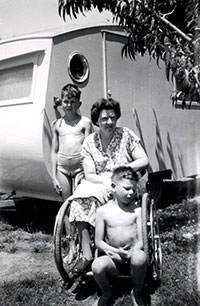 Chris and I grew up in the blissfully naïve ’50s. We broke most of mum’s pot plants playing backyard cricket. We gazed at our new Queen as her cavalcade moved along a crowded city street. We watched Ron Clarke light the Olympic torch at the MCG. We played down the river. We learned at school that Australia had 200 million sheep. We laughed at I Love Lucy, watching our 21 inch telly while eating a plate of chops and mashed potato on our laps. We cried when mum accidentally backed her wheelchair over and crushed a baby magpie we had adopted.
Chris and I grew up in the blissfully naïve ’50s. We broke most of mum’s pot plants playing backyard cricket. We gazed at our new Queen as her cavalcade moved along a crowded city street. We watched Ron Clarke light the Olympic torch at the MCG. We played down the river. We learned at school that Australia had 200 million sheep. We laughed at I Love Lucy, watching our 21 inch telly while eating a plate of chops and mashed potato on our laps. We cried when mum accidentally backed her wheelchair over and crushed a baby magpie we had adopted.
But the ’50s was also a decade of change. The Simpson automatic washing machine, the Kelvinator fridge, the Hoover vacuum cleaner and the Sunbeam Mixmaster liberated women from much of the time-consuming drudgery of traditional housework. Mum learned to drive a Morris Minor fitted out with a hand control. Now, she could get out of the house every day. She could drive down to the shops, waiting outside until the shopkeeper noticed her — while local belles walked past with their noses in the air. She could drive to church each Sunday. I had to go with her because none of the congregation would risk getting dirt on their suits lifting mum’s chair out of her boot. (Anyway, wasn’t what she had contagious?)
Still, mum was content. Once or twice, I even heard her sing. She had a family here now. The fibro bungalow had turned into a solid brick family home. Mum had her African violets, her canaries and her crocheting. She had a companion in our beloved dog, Rexie. She had her circle of friends. She belonged to the Disabled Motorists Association. And she could watch her two boys grow up into robust young men.
Whenever a parent or child has an on-going, serious illness there is a special bond between them. Mum and I were great pals. We bought our first record player together (His Masters Voice) and our first LP (Paul Robeson). We would shop at Myers, in the city or Chadstone, and afterwards treat ourselves to chocolate sundaes and lemonade spiders. When I was in primary school, I would race home every day for lunch. Mum would coat slices of bread with hundreds and thousands. I would gobble them down, and race back, always turning to wave to her from the top of the stile at the back fence before disappearing down the hill.
My mum was a good, gentle woman. I cannot think of a single mean thing she ever did. She never spoke harshly about anyone. She never swore, never complained. She worked hard to keep our house clean and tidy (with the help of a neighbour who came by one day a week). She began preparing our evening meal at three o’clock each afternoon. She was religious. She joined the Church of the Infinite Way in the ’60s, and prayed to their God to help her walk again.
Mum didn’t say a word the time I wagged Sunday School and went swimming in a muddy dam in my best clothes. She comforted me when I was sick after eating raw kangaroo steak we fed our dog Rexie. She stuck by me during my teens, when I was torn between family values and mindless rebellion. She hid from me the fact that she was having a breast removed, worried it might affect my Matriculation results. She tried to smooth things over after family arguments about the Vietnam War.
In 1970 my dad sold our family home. My parents and brother went to live on a farm in south-eastern Queensland. (I stayed in Melbourne.) Mum tried to adjust to her new environment by taking painting lessons and attempting to make friends in a farming community so conservative that some women would sit in the car for two hours outside our farmhouse while the men chewed the fat. Soon after moving north, mum wrote to tell me that “our dear pal” Rexie died. He had been a much-loved member of our family for ten years. To make matters worse, bush war had broken out in Rhodesia. Letters from Africa were now full of talk about what the “terrs” were up to.
In 1973, my dad sold their Queensland farm and bought a farm in Victoria. Mum had to begin all over. But by this time, she was becoming increasingly fragile. She could no longer drive. She had developed Parkinson’s Disease, a by-product of encephalitis (which is what she had all along).
Finally, dad could no longer look after mum. She had to be admitted to the geriatric wing of the local hospital. She was unable to feed herself and was losing the power of speech. To his eternal credit, every lunchtime, my brother would leave the timber mill where he worked and spoon feed mum with his big dirt-stained paws. On one of my visits, she told me, she was dying. She said she wanted nothing more than to be able to crawl into a little African mud hut by a river.
She held on until Christmas 1979, giving me $5.00 she had put aside to buy her then only grandchild (my daughter Kate) a plastic tea-set. Three days after Christmas she died. She died in pain, from septicaemia triggered by poor pressure care. She would have died anyway, but she didn’t deserve to die that way. Now she is in the heaven of my heart. When she was alive, I am ashamed to say, I never told her that I loved her. As I battle back my tears, I am sure that she knew it all along.
